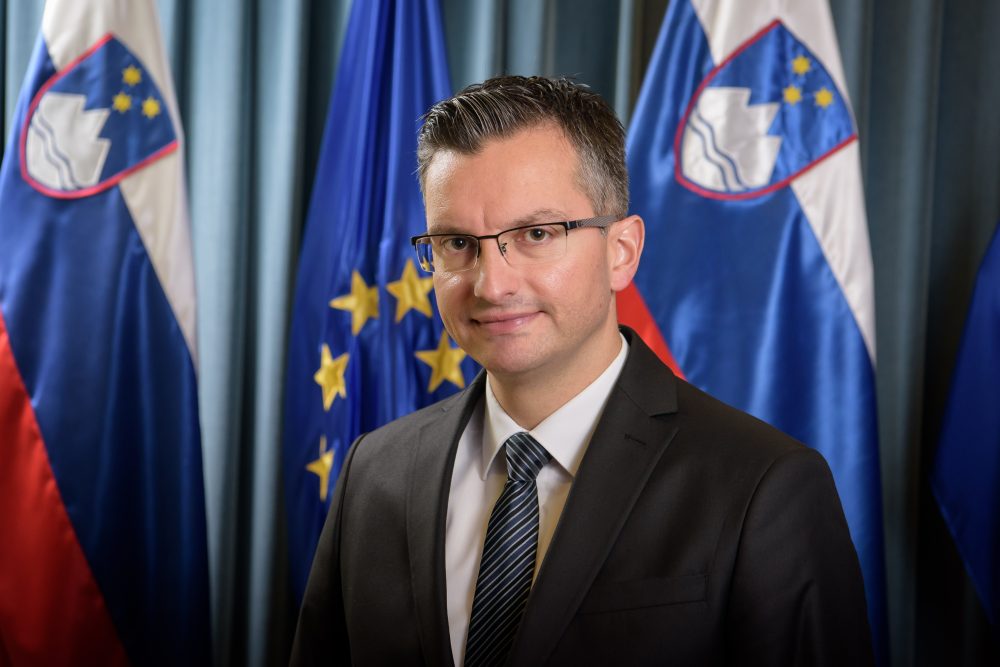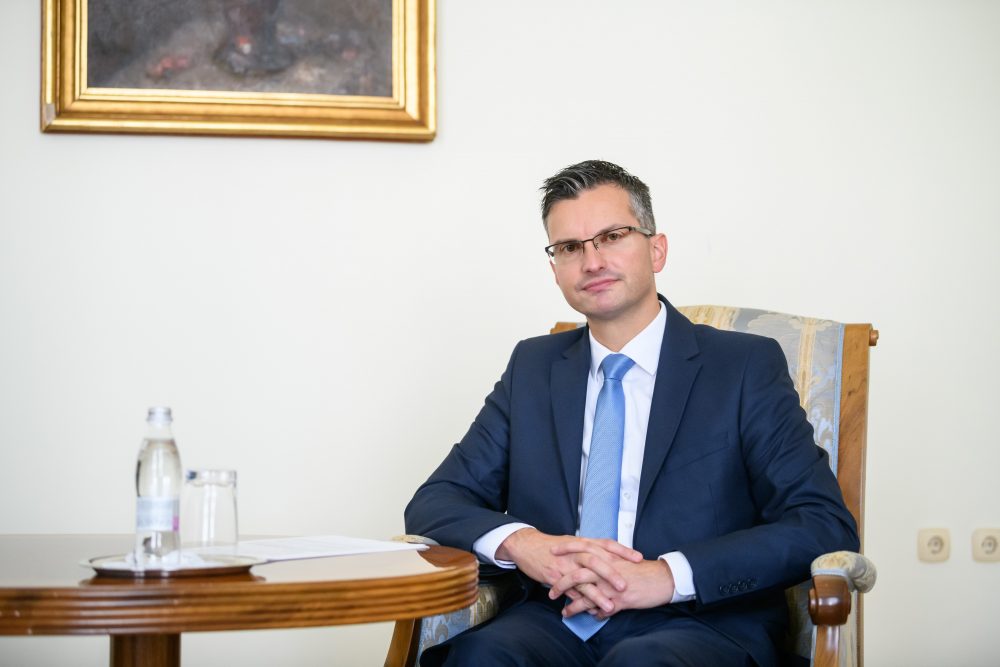In December, we will carry out an overview of our cooperation as well as exchange views and suggestions on where cooperation could be further strengthened, particularly in complementary fields

The joint session of the governments of Serbia and Slovenia will be held in December. The Slovenian Prime Minister of Slovenia Marjan Šarec talks about this event as well as the relationship between the two countries.
Slovenia and Serbia have signed an agreement on the employment of Serbian nationals in Slovenia, which began to be implemented in September. Could you tell us what this agreement means for both countries and what are the results of its implementation so far?
– In Slovenia, 45 percent of employers are facing a labour shortage. This is why we aim to proactively plan and provide solutions to the long-term requirements of a suitable workforce. Since the implementation of the Agreement on the Employment of Citizens of Bosnia and Hercegovina had positive effects, we decided to conclude a similar agreement with Serbia. The agreement entered into force in September this year. I am glad that, even in this short period, we can conclude that the agreement is bringing positive outcomes – for the Slovenian labour market and for workers who enjoy better legal and actual protection. In addition to the agreement, Slovenia also held two big career fairs in Serbia, one in Belgrade and one in Niš, with the aim of boosting activities between Slovenian employers and potential Serbian employees. The outcome was very good with a high level of interest shown among Serbian citizens to work in Slovenia, while Slovenian employers also showed great interest in participating in such events.
What are your expectations from the joint government session to be held in December this year?
– For some years now, Serbia and Slovenia have an established practise of regular joint government meetings that positively affect the strengthening of cooperation in all areas, promote closer inter-governmental ties, enable more effective identification of joint projects and goals, as well as address the remaining open issues. Emphasis is put on bilateral political relations, the implementation of the succession agreement, economic cooperation and Slovenian support of the Serbian EU membership. To date, four such meetings have already taken place. Our intention is to continue cultivating positive relations and friendly ties, and to boost all-round cooperation between the two countries. In December, we will carry out an overview of our cooperation as well as exchange views and suggestions on where cooperation could be further strengthened, particularly in complementary fields. I would like to focus on as many concrete opportunities as possible, such as addressing challenges faced in rural development and empowering young people. Slovenia has many positive experiences in this field, especially due to the advantages offered by our EU membership. We wish to trans for these positive experiences – Slovenia is not only a supporter of Serbia’s path to the EU, but can also be a partner to your country and a transmitter of opportunities offered by the EU already during the negotiation process.
Bilateral relations between the two countries are very strong, as evidenced by the high-level and top-level mutual official visits. Where do you see room for further advancement of relations between the two countries?
– This is true; the mere number of high-level meetings this year reflects the friendly relations between our two countries. Let me mention three important events – the visit by Slovenian President Pahor and his address to deputies in Serbia, the visit by the Speaker of the Serbian National Assembly Gojković in Slovenia and my very successful visit to Belgrade in late August, where Prime Minister Brnabić and I, among other things, agreed to hold a forthcoming government meeting. The relations between Slovenia and Serbia are very dynamic and diversified. Good bilateral cooperation has been established in practically all fields. In economic cooperation, which has a prominent place in our relations, ever-new opportunities to take cooperation to a next level keep opening up. Other areas with significant untapped potential include environmental protection, science, culture and education. Slovenian and Serbian people cultivate close ties, which is reflected in our thriving cultural cooperation. In education, we would like to further facilitate interaction between students, and I am happy to note that the number of Serbian students coming to study in Slovenia has been growing annually. We also regularly address contemporary challenges – the two countries have established very good cooperation in migration management, and Slovenia continues to deploy police officers to Serbia. I would also like to stress the importance of the implementation of the Agreement on Succession Issues. Progress has been achieved in recent years, which we applaud, but believe that the succession process itself could be intensified, and Serbia is Slovenia’s valued partner in this respect.

Intervju s predsednikom vlade Marjanom Sarcem.
The trade between Slovenia and Serbia increased by 14% last year. What results do you expect this year?
– According to statistics for the first seven months of 2019, we expect additional slight growth. It is important to note that in addition to the trade volumes between our two countries, Slovenian investments in Serbia amount to one billion euros, and Slovenia is also placing a portion of their products on the Serbian market. Further opportunities for increasing mutual trade and economic cooperation are in the ICT industry, digitalisation and innovative technologies, environmental protection, transport, tourism and energy infrastructure.
Tourist traffic between Slovenia and Serbia is increasing every year. What is the potential for cooperation in this segment?
– In 2018, 137,517 guests from Serbia visited Slovenia, which is 10.4% more than in 2017. They generated 376,163 overnight stays, or 16.9% more than in 2017. I believe that significant increases are possible on both sides, taking advantage of winter holidays, Slovenian natural spas, summer on the Slovenian coast and business tourism.
You have asked the European Union to expedite the accession negotiations with Serbia. What is your view of Serbia’s efforts towards the EU accession? How much can Slovenia help Serbia on its path to the EU?
– Slovenia is a very strong supporter of the EU enlargement perspective for the Western Balkans. We are stressing the importance of strengthening and respecting the rule of law, and implementing the necessary reforms. At the same time, we firmly believe that once progress is achieved, the EU member states must respond and enable progress of the accession of countries on their path to the EU. The enlargement process is the EU’s most important tool for ensuring economic and political stability of the region. Personally, I was disappointed by the fact that last European Council was not able to agree on starting the negotiation process with North Macedonia and Albania. Slowing or shutting down the process could have serious repercussions for the reform progress and regional relations. This said, I believe it is vital that Serbia keeps reaffirming its commitment to the EU in all fields, and that EU membership remains high on the Serbian political agenda. The EU accession process is lengthy and I am aware that it may be difficult to sustain the momentum necessary for reform, but membership in the EU brings many advantages for the country and its citizens – security, the rule of law, a stable business environment, a larger economic area and market, and a higher standard of living. In Brussels, Slovenia, when it comes to Serbia, calls attention to the importance of the dynamic opening of negotiation chapters when the criteria are met. Furthermore, we are working persistently on raising awareness of the strategic importance of Serbia’s progress towards EU integration. The European Union will not be complete without this region. Slovenia will thus continue to grant political support and expert assistance in Serbia’s negotiation process with the EU, which is implemented in the framework of bilateral technical assistance, twinning projects and various expert exchanges. The assistance provided by Slovenia responds to the current needs of the Serbian side in preparing negotiating positions and meeting the criteria for the opening of chapters. Slovenia has been providing technical assistance since 2015, and has so far covered the scope of ten negotiation chapters in Serbia’s EU accession process. At the moment, the technical assistance is focusing on regional policy and rural development. With regard to IPA-funded activities, Slovenia participates in two twinning projects – regarding the combating of human trafficking, and regarding migration and asylum issues. Let me also mention the projects carried out in Serbia within the scope of development cooperation that are not directly linked to the negotiation process, but improve the quality of life. For instance, the water purification plant project in Zlatibor, for which Slovenia allocated 1.5 million euros, is just about to be completed, and the public lighting project in Kraljevo, to which Slovenia contributed 0.8 million euros, should be finalised by the end of the year.